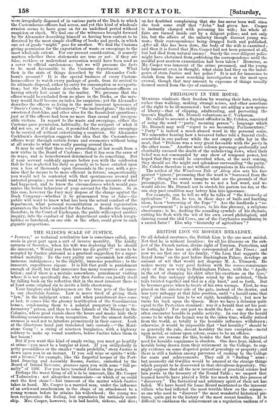TICE SLIDING SCALE OF JUSTICE.
" ItsricE," as technical retributive law is sometimes called, pro- ceeds in great part upon a sort of inverse morality. The kindly sarcasm of Socrates, when his wife was deploring that he should die innocent, " Would you then have me die guilty ?" seems to be accepted by Justice aforesaid as a practical suggestion for a super- refined morality. To the very guilty our squeamish law allows immense indulgences ; to the slightly, immense penalties ; to the innocent, superfluous rigour, it is felt that guilt is punishment enough of itself, but that innocence has many resources of conso- lation; and if there is a mistake somewhere, punishment visiting where it is not specifically due, why then Justice can justify itself' by falling back on the reflection that in the most innocent there is at least some original sin to invite a little chastening.
Your burglars and highwaymen are the true pets of the fancy to our charitable Justice. Law is never tired of giving them "law," in the indulgent sense ; and when punishment does come at last, it comes like the gloomy beatification of the Scandinavian heroes, condemning them to a palatial purgatory in some " re- formatory " prison, and then to some Islands of the Blessed in the Colonies, where good viands cheer the hours and masks hide their blushing countenances from recognition. But the utmost fastidi- ousness is used not to interfere prematurely in their career. Look at the illustrious band just translated into custody—" the Maid- stone Gang " : a string of nineteen burglaries, with a highway robbery to make up round numbers, before Justice takes them to her bosom !
But if you want this kind of ample swing, you must go heartily at crime—you must be a burglar at least. If you shillyshally in petty peccadilloes or the smaller "male prohibita," stern Justice is clown upon you in an instant. If you sell wine or spirits "with- out a licence," for example, like the forgetful keeper of the Port- land Dancing and Assembly Rooms, Justice, embodied by the Board of Inland Revenue, pounces upon you with some "full pe- nalty" of 1201. For you have touched Justice in the pocket. Perhaps the worst thing of all is to be innocent, like Mr. Cooper of Todmorden ; not altogether immacu ate—or which of us could east the first stone P—but innocent of the matter which Justice takes in hand. Mr. Cooper is a married man, under the influence of an awkward anachronism in the shape of an attachment to a young woman before he attains his widowhood; the young wo- man reciprocates the feeling, but repudiates the untimely court- ship. Mrs.. Cooper, however, is in bad health, sickens, and dies; on her deathbed complaining that she has never been well since she took some stuff that " John " had given her. Cooper
is instantly charged with poisoning wife ; his whole af- i
fairs are turned side out by a ,ll'eent police; and not only his, but the affairs of the unlucky though discreet young wo- man; their correspondence being dragged forth and published. After all this has been done, the body of the wife is examined ; and then it is found that Mrs. Cooper had not been poisoned at all, but had died from natural causes ! Surely the over-diligent police might have abstained from publishing the correspondence until the needful post-mortem examination had been taken ? However, as Mr. Cooper was innocent of the crime presumed, and the young lady innocent even in thought, what claim had they on the indul- gence of stein Justice and her pollee? It is not for innocence to shrink from the most searching investigation or the most open avowal, though that may amount to exposure• of things usually deemed sacred from the eye of curiosity.


























 Previous page
Previous page